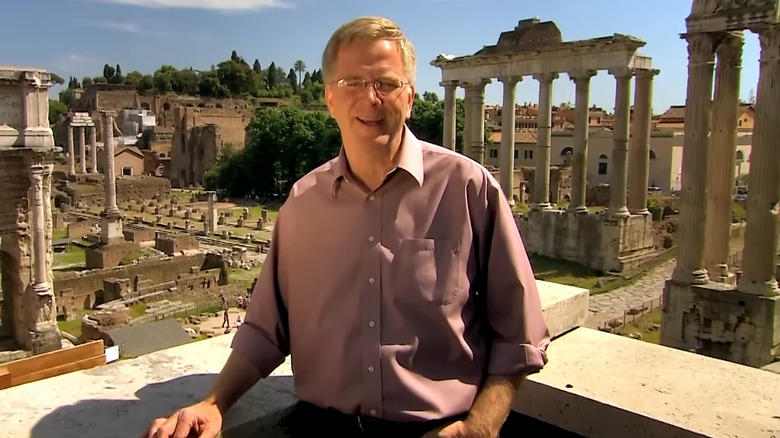Travel is a balm for the soul. It brings you to new places and sets you down right in the middle of a phenomenally enriching cultural revelation. Those who wander frequently may be partial to specific regions of the United States or prefer a certain continent or country located somewhere else in the world. Explorers often seek out a mixture of familiar haunts and new experiences, testing their mettle and bringing brand-new environments into their lives.
But travel isn’t without its difficulties and challenges. From the long-haul flights that international jetsetters brave to the minute differences in power, currency, and conversation, there’s plenty to prepare for ahead of a new adventure. Rick Steves offers a plethora of great examples, however, for the perpetual wanderer. He’s a seasoned traveler who helps guide adventurers throughout Europe in tour format and a slightly wider footprint in the form of guidebooks and videos. His forum is another fabulous resource for travelers seeking help navigating a global landscape of opportunity. Rick Steves has spent countless hours touring the world, and many of the things he does personally can act as small helping hands to improve your own experience. Those who have traveled extensively will know that a few little tricks and habits can make all the difference, and fortunately, Steves is forthcoming with many of his most useful.
Money preparation

Before leaving the house, Rick Steves takes some time to think through his payment options and take steps to ensure a smooth adventure, complete with a pre-trip money checklist. This means adjusting ATM withdrawal limits on your debit card — or cards — and checking for the ‘contactless’ symbol on your Visa and MasterCard plastic. Steves suggests packing cards with these brand logos and potentially leaving American Express or Discover cards at home altogether: They aren’t widely accepted abroad, although the U.K. is a notable exception to this rule. Contactless payment is the standard in Europe and across Asia, so getting comfortable with tapping your card rather than inserting it will help you enjoy a stress-free holiday.
You’ll also want to contact your bank to give a heads-up that you’ll be traveling. There’s nothing worse than landing in a new country or city and pulling out your card to buy a meal or withdraw cash at the ATM and freezing your account rather than spending from it. Applying a travel notification on the cards you’ll be using (now often performed through your banking app rather than in person) will make for a seamless trip, money-wise. On that note, Steves suggests it’s no longer useful to head into the bank to exchange currency either. ATMs can be found in abundance in virtually any city you visit, and exchange rates are now quite favorable compared to your bank’s fees.
Rick Steves always packs light

One of the most important tricks that Rick Steves deploys when traveling starts before he leaves home. Steves is a major proponent of packing light. He only packs a checked bag if there is an absolute necessity for the extra weight. He is a strict packer and will only take what he can carry in a small day bag and a moderately sized rollaboard suitcase that fits in the overhead compartment when flying. For one thing, packing light allows him to roll with the punches when changes occur in flight schedules or boarding gate information. Even when he has to make a fast trek across the airport, lightweight packing makes it a breeze to get where he’s going. Moreover, once Steves arrives at his destination, he can hop off the plane and head straight into the city for whatever excitement awaits him. The experienced traveler never has to wait for a bag to be unloaded off the plane and sent down through the baggage carousel. This also means that lost luggage is virtually nonexistent in Rick Steves’ vocabulary.
The benefits of packing light also present themselves while exploring a new destination. Rather than having to lug around a bulky suitcase, his light bag can be zipped around town without pain or fatigue. Travelers who check bags often have to contend with where to leave their suitcases during interim time periods between connections or hotel reservations, but Steves never has to worry about this.
Voltage and converter checks
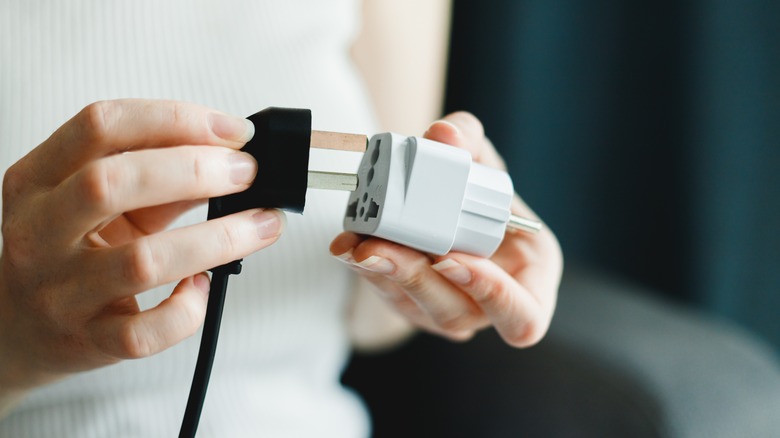
Vladeep/Shutterstock
Rick Steves is an avid European traveler, and Steves spends around four months every year across the Atlantic. Therefore, whenever he plans a new trip, he is keenly aware of the power conversion issues that may rear their ugly head. Europe relies on two main plug types to power electronic devices, with the continental mainland showcasing a dual (or three-pin) round setup and Ireland and the U.K. plugging in with a three-pronged, rectangular outlet layout. No matter where in Europe you’re traveling, you’re bound to need a power converter. Neither of these plug types will support the standard American plugs, and both run a 220-volt circuit rather than the 110-volt power output found in the United States. The same considerations must be made for travel virtually anywhere internationally, with a few notable exceptions, including China (the voltage setup isn’t the same, but the plug shape is virtually identical, and American devices will largely work when plugged directly into the wall, although an adaptor will make it safer).
Steves suggests carefully inspecting any device you plan to bring with you. Inspecting its tag or any kind of serial number plate emblazoned on the side will help you identify voltage conversion issues. Many devices will operate on either system and simply need an adapter to change the plug configuration. However, not all electronic devices will work universally. Dyson hair dryers, for one, are built on one platform or the other and cannot be used interchangeably.
He prepares for theft but doesn’t let it sour the mood
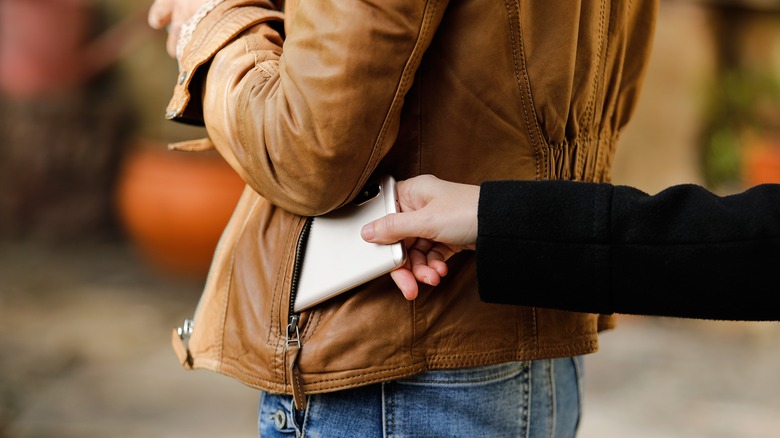
Alejandro J. Vivas/Shutterstock
Steves notes that he has been the target of a few thefts and other criminal activity aimed at cashing in on a tourist’s minimal knowledge of the area and potentially high monetary value. This is to be expected with such a high volume of travel under his belt, but considering how often Steves travels, it is a rare occurrence. Preparation is key. Steves always wears a money belt rather than carrying his wallet in his back pocket. Moreover, one of the very few times he has been pickpocketed came while he wasn’t wearing this anti-theft device, further cementing the value it brings. It might seem like a small thing, but it is a simple trick to avoid being pickpocketed. Rick Steves isn’t one to follow the crowds and this brings him a little farther out of the way from a typical pickpocketing environment. Looking for destinations off the beaten path will take you away from some of the most heavily populated areas where theft targeted at tourists is most common.
However, Steves understands the risks, and if he is targeted, he makes sure not to let the incident ruin the mood of his trip. It’s easy to let something like this completely overshadow all the positives. But you simply can’t let that happen. Steves has learned to roll with minor and major setbacks and doesn’t let them put a dampener on an otherwise fantastic adventure.
Visit your doctor and consult your insurance provider

Studio Romantic/Shutterstock
Tackling any healthcare needs you might have is high on Rick Steves’ priority list, both as a general piece of advice and for his own personal travel. Visiting the doctor to check in on any medical conditions is an excellent step in the preparation process ahead of every trip you take. Getting advice on your unique circumstances and stocking up on any prescriptions you might take will prepare you for the rigors of travel and keep you ready throughout the entire trip.
Your doctor will be able to provide specific guidance on activities you can participate in and things that may be better off avoided. If you are at all hesitant about your wellness, visiting the doctor should be one of the key things on your pre-departure checklist. Not only will you be able to put your mind at ease knowing you’ve got your medication covered, but you will walk out of the appointment with all the information you need on staying healthy and feeling your best. The last thing you’ll want to do is compound the effects of an injury or illness with a fear of missing out or added strain while on vacation.
Make reservations at popular attractions

frantic00/Shutterstock
As you plan your trip, the possibility of exploring a bevy of activities while out and about in your chosen destination can seem endless. Rick Steves notes that not all attractions are easily accessible, and some require advanced reservations that might sell out by the time you arrive. Iceland’s Blue Lagoon and Amsterdam’s Anne Frank House, for instance, both require a reservation and can quickly run out of availability.
Rick Steves doesn’t typically make a large slate of popular attractions his bread and butter while traveling, but any big ticket item that is on his list of must-see places often requires a bit of foresight. Anything that needs advanced reservations he tackles early in the planning process to avoid disappointment and avoid last-minute booking options that may not suit the rest of his travel plans. The last thing you’ll want to do is choose between skipping something you really want to see and rearranging your whole trip on the fly. This approach is only possible if you’ve taken some time to plan at least certain elements of your adventure, though. Therefore, one major takeaway from his travel playbook is just that: Ample planning.
He prepares his home for vacancy and acts as a good steward for the environment
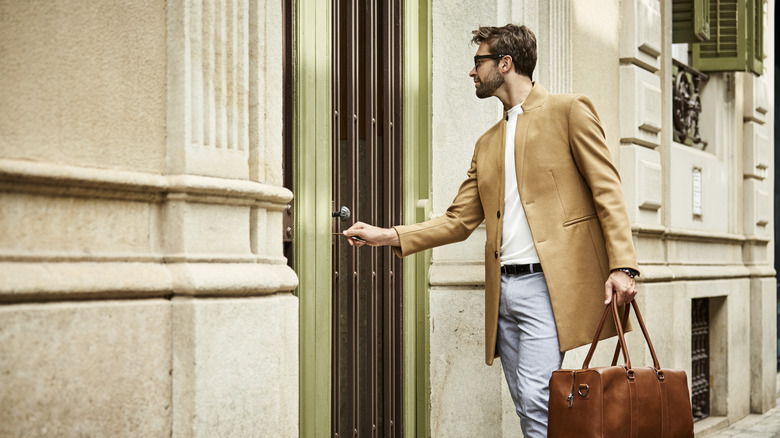
Morsa Images/Getty Images
Rick Steves is quick to point out the exceptional environmental stewardship that Europeans, in particular, showcase in their legislative agendas and everyday lives. Globally, amazing things are happening at the grassroots and individual levels when it comes to taking care of the planet. In Europe, energy-efficient travel can be found in abundance, and things like trains and other public transportation options are often both energy-efficient and cost-effective. In deference to the environmentalism that Europeans prioritize, Steves does his best to live by the same mantras.
Before he leaves home, Rick Steves prepares the house to be vacant, both for security reasons and to do his part for the environment. If you don’t already have a security system, investing in one is a great idea ahead of your next adventure. Additionally, unplugging or turning off appliances and other electronics in your home will help save energy, cutting down your electricity bill and adding your weight to the fight against climate change. When he finally arrives at his destination, Steves likes to participate in environmentally friendly activities alongside the great public transportation options available. He’s a proponent of bike tours and can often be seen packing a collapsible water bottle in his day bag to cut down on single-use plastics.
He creates a check list of high value items left at home, too
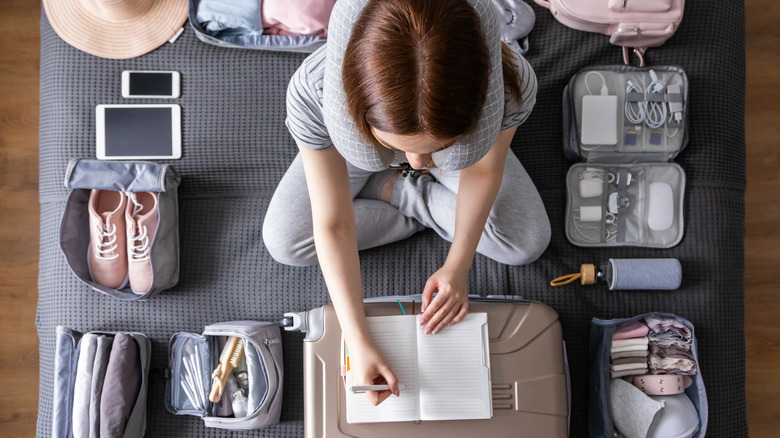
Kostikova/Getty Images
Many travelers will be familiar with creating a concise packing list. On a big trip, it may be helpful to write down a list of all the things you’ll need while you’re away and then check them off as you add them to the bag. Rick Steves utilizes this strategy often enough, but he also creates a secondary checklist to help create added peace of mind while he’s away.
When Steves prepares to leave on yet another big adventure, he goes through a checklist of high-value items he’ll be leaving at home. Not only is it important to think through personal safety and security while exploring a brand new place, but there’s also the home and its things to consider. Losing your wallet or phone while on vacation can be a real downer, but it’s often nothing compared to the potential devastation created by a burglary back home. To ward against this, Steves writes up a checklist of expensive and important items at home so that he can take into account some of his most important belongings in the event of the unthinkable. Upon returning home, running through this list and finding each one of these valuable items will allow you to seamlessly transition back into your daily routine.
Rick Steves looks to embrace local culture

Monica Rodriguez/Getty Images
Rather than seeking out mass-produced recommendations from social media, Rick Steves lets the city and people be his guide. This allows him to miss the most heavily crowded tourist areas of any destination he might be visiting — unless, of course, a stop at one is truly warranted.
Steves likes to seek out places that locals frequent, often for opportunities to take in the community in its natural state rather than the over-curated facades of touristy areas. These spaces often gloss over a community’s authentic cultural treats while serving up expensive meals and drinks, creating vulnerability to pickpockets and generally providing far more traffic than is required. Local culture in its true environment is what Steves is after when he travels, and in his estimation, this makes all the difference between a truly unforgettable adventure and one that just hits the highlights and creates a pleasant memory.
He tries to take in the moment rather than allow discomfort to annoy him
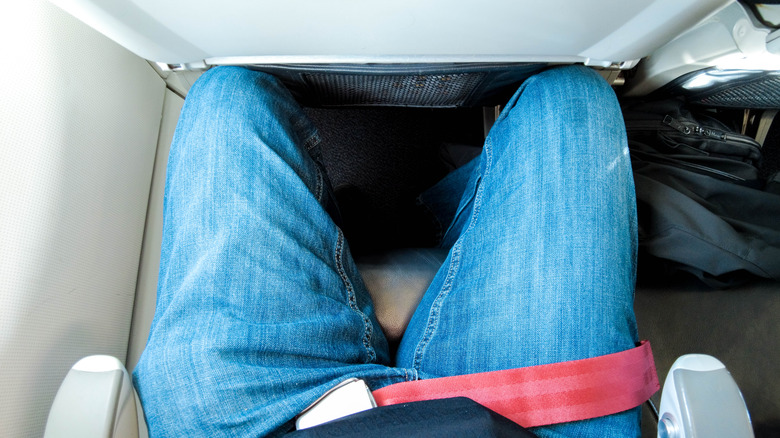
Norrie3699/Getty Images
Crowds are inevitable wherever you are, and flight crampedness can’t be avoided. It’s far too easy to become cranky and allow these inconveniences and discomforts to set the tone for your trip and your mood. Rick Steves and those he travels with like to keep an open mind and remember what and why they are exploring. It’s crucially important to roll with the punches and remember the meaning and reasons behind your voyage. A long flight can be a bummer, but at the other end of that journey is a fabulous new experience, regardless of whether you’ve been there many times before or are checking off a new place on your list.
Enjoying the moment is the best way to maintain positivity in your travel, even if you’re dealing with some unpleasantness in the present. It isn’t too challenging to relate to this tidbit of advice. Whether it be voyaging north into the Guatemalan jungle to gasp at the ruins of Tikal or riding through the night to dive with whale sharks in Cebu, uncomfortable bus journeys each bring travelers to breathtaking new adventures that they wouldn’t trade for anything. Steves offers up a golden nugget of wisdom with this mindset.
Steves takes home the most precious souvenir of all from every trip

Morsa Images/Getty Images
Rick Steves is a collector of stories, experiences, and, of course, souvenirs. He wouldn’t be a traveler without indulging in that urge to purchase something (or a few somethings) to bring back for himself and those who are important to him. But Steves does something that many people simply overlook when it comes to thinking about travel and collecting souvenirs. Steves is a voracious journaler and consistently writes about his experiences while out and about. Writing a journal can help enrich your travel experience tremendously, and Steves advocates for this practice with extreme vigor. But there’s another reason to keep a journal while you’re traveling, and it’s so valuable that Steves recommends that all travelers keep a log of their experiences while exploring each new place.
Whether you’re a pen-and-paper kind of person or a tech-savvy personal blogger, writing down a few or a great many notes about your experiences and the things you’ve encountered while traveling can act as one of the most precious souvenirs you’ll ever bring home. Creating a journal documenting your travels will allow you to revisit all of these wonderful experiences anytime you wish. Writing while the adventure is fresh and new will help you return to the sights, sounds, tastes, and smells long into the future.

